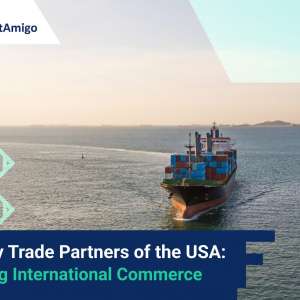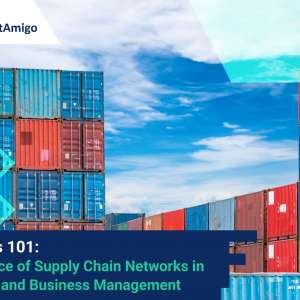In today’s globalized economy, businesses involved in international import/export activities are constantly seeking strategies to optimize their supply chains and reduce costs. One such strategy that has proven to be highly effective for many companies, including large U.S. multinationals, is the use of Foreign-Trade Zones (FTZs). While FTZs have been predominantly utilized by major corporations, the truth is that almost any company engaged in international trade can benefit from the strategic use of these designated areas. By taking advantage of the various advantages offered by FTZs, businesses can significantly reduce duties, streamline logistics, gain better control over inventory and costs, and enhance overall supply chain operations. In this comprehensive guide, we will explore the concept of FTZs, delve into their numerous benefits, discuss the strategic side of utilizing FTZs, and highlight the competitive advantages they offer in terms of supply chain integration.
Author Name:Tiffany Lee – Marketing Analyst at FreightAmigo
Want to compare the best Express, Air Freight, Sea Freight, Rail Freight & Trucking rates so as to have better control on cost?
What is Foreign-Trade Zones (FTZs)?
At their core, FTZs are specially designated areas located near U.S. ports of entry that are considered outside the U.S. Customs territory for import/export purposes. This unique status enables companies operating within an FTZ to import raw materials and other goods into the U.S. without immediately paying duties, taxes, and fees on them. Duties, taxes, and fees on goods warehoused in an FTZ are only due when the goods enter the U.S. market for sale, and they are not paid if the goods are re-exported outside the U.S. This duty deferral mechanism offers significant financial advantages to businesses, as it allows them to free up cash flow and allocate resources more strategically.
In addition to the duty deferral benefit, FTZs offer a wide range of other advantages that can lead to substantial savings and operational efficiencies for businesses. Let’s explore some of these benefits in more detail.
Reduced Merchandise Processing Fees (MPFs)
One of the immediate cost-saving advantages of operating within an FTZ is the reduction in Merchandise Processing Fees (MPFs). MPFs are fees imposed by U.S. Customs and Border Protection (CBP) on most goods imported into the United States. The MPF is calculated as a percentage of the entered value of the goods, with a minimum fee and a maximum cap. By utilizing an FTZ, businesses can significantly reduce their MPFs, resulting in substantial savings, especially for high-value goods.
Streamlined Logistics and Supply Chain Operations
Operating within an FTZ facilitates streamlined logistics and supply chain operations. Companies can leverage the strategic location of FTZs near ports of entry to optimize the movement of goods. FTZ operators can request Direct Delivery, which enables merchandise to move directly from the port of arrival to the FTZ, reducing customs delays and expediting the transportation process. This faster customs handling and speed-to-market can give businesses a competitive edge in the market.
Another advantage of utilizing an FTZ is the ability to utilize a Weekly Estimated Entry. This means that goods entering an FTZ can be pre-approved for release into the U.S. market, enabling faster inventory turnover and reducing the time it takes to get products to the end consumer. Moreover, the ability to defer duty payments until goods enter the U.S. market helps preserve cash flow and provides businesses with more financial flexibility.
Precise Inventory and Cost Control
FTZs offer businesses better control over inventory and costs. By warehousing goods in an FTZ, companies can maintain more precise inventory records and have real-time visibility into their stock levels. This enhanced inventory control allows businesses to optimize their supply chain, reduce stockouts, and improve overall operational efficiency. Additionally, having goods stored in an FTZ gives businesses the flexibility to manage inventory levels based on market demand and fluctuations in supply, ensuring they can meet customer demands while minimizing storage costs.
No Duties on Waste, Scrap, or Defective Parts
Another advantage of operating within an FTZ is the exemption from duties on waste, scrap, or defective parts. Businesses can discard or export damaged or faulty goods without incurring duty costs, reducing financial losses and improving cost efficiency. This benefit is particularly valuable for industries that generate a significant amount of waste or have a higher likelihood of producing defective parts, such as manufacturing, automotive, or electronics.
No Time Limit on Storage
Unlike traditional bonded warehouses, FTZs do not have a time limit on storage. This means that businesses can keep their goods in an FTZ for an indefinite period, providing them with maximum flexibility in managing their inventory. This advantage is particularly beneficial for businesses that deal with seasonal or fluctuating demand, as it allows them to store excess inventory during off-peak seasons and release it when demand increases.
Lower Insurance Premiums
Operating within an FTZ can also lead to lower insurance premiums for businesses. Since goods in an FTZ are considered to be outside the U.S. Customs territory, they are often subject to reduced insurance rates. This cost-saving advantage further contributes to the overall financial benefits of utilizing an FTZ.
Enhanced Security and Better Risk Management
FTZs offer enhanced security measures and better risk management for businesses. These designated areas are subject to stringent security protocols and are closely monitored by U.S. Customs and Border Protection (CBP). The heightened security measures help mitigate the risk of theft, damage, or unauthorized access to goods. By operating within an FTZ, businesses can have peace of mind knowing that their inventory is protected and secure.
Supply Chain Integration and Cost Advantage
Integrating the benefits of FTZs into supply chain operations can result in significant cost advantages for businesses. By strategically utilizing FTZs, companies can optimize their supply chains, reduce costs, and gain a competitive edge in the market. Let’s explore how supply chain integration within an FTZ can lead to substantial savings.
Imagine an automotive manufacturer operating within an FTZ. Suppose the manufacturer purchases tires from a tire supplier who also operates within an FTZ. In that case, the tire supplier can move the tires in-bond from its FTZ to the automotive manufacturer’s FTZ. Neither party would have to pay duty on the tires until they enter U.S. commerce. If the tires are then shipped from the second FTZ into U.S. commerce before being incorporated into the manufacture of a car, they can be designated as privileged foreign status or part of a car using non-privileged foreign status, depending on the applicable duty rate. Ultimately, if the tires or the car is exported, no duty liability is owed.
This example demonstrates how businesses can leverage the advantages of FTZs to create a cumulative cost advantage throughout the supply chain. By replicating this process for numerous parts and components, the FTZ-based auto manufacturer can offer suppliers a competitive advantage that ultimately saves all parties involved a significant amount of money. This approach can be applied to other industries as well, such as apparel, aerospace, electronics, pharmaceuticals, and technology, where FTZs can provide a competitive edge by optimizing supply chains and reducing costs.
Achieving Supply Chain Visibility and Efficiency
Operating within an FTZ requires strict reporting and record-keeping obligations. Businesses must keep complete supply chain records, including details such as import countries of origin, transport companies, customs classifications, warehousing information, inventory processing, use of materials, manufacturing events within the FTZ, and export data. While these reporting requirements may seem daunting, they offer businesses the opportunity to achieve end-to-end visibility of their supply chain operations.
By leveraging software automation and data management tools, businesses can streamline their reporting processes and gain valuable insights into their supply chain. This enhanced visibility allows companies to identify inefficiencies, protect themselves from disruptions, and gather strategic intelligence. By partnering with industry experts like FreightAmigo, businesses can ensure compliance with reporting requirements while optimizing their supply chain operations to achieve maximum efficiency and cost savings.
Conclusion
In today’s highly competitive global marketplace, businesses must explore every opportunity to optimize their supply chains, reduce costs, and gain a competitive edge. Foreign-Trade Zones (FTZs) offer a multitude of advantages that can help businesses achieve these goals. By operating within an FTZ, companies can benefit from duty deferral, reduced merchandise processing fees, streamlined logistics, precise inventory and cost control, enhanced security, and supply chain integration. These advantages, when combined strategically, can result in significant cost savings, improved operational efficiency, and a competitive advantage in the market.
To unlock the full potential of FTZs, it is crucial to partner with experts who understand the intricacies of FTZ operations and logistics. FreightAmigo, a trusted industry leader, offers consultation, logistics planning, customs compliance, duty management insights, and FTZ site selection assistance. By collaborating with FreightAmigo, businesses can optimize their supply chain, navigate customs regulations, and capitalize on the benefits offered by FTZs. Streamline your international trade operations, improve efficiency, and take advantage of cost-saving opportunities within FTZs by partnering with FreightAmigo.
There are different options for cargo transportation. If you want to choose the most convenient and suitable solution, it is best to have the full support of logistics experts! If you are planning to ship goods overseas, please go to the FreightAmigo page for inquiries.
===
Read More:
【The Key Trade Partners of the USA】Boosting International Commerce
【Goods-to-Person Systems】Revolutionize Order Picking in Warehouses
【Robotic Sortation Systems】Revolutionizing Warehouse Operations
===
If you have any inquiries on logistics/supply chain, feel free to contact FreightAmigo now:
Chat with us online OR
Phone : +852 28121686
WhatsApp: +852 27467829









































